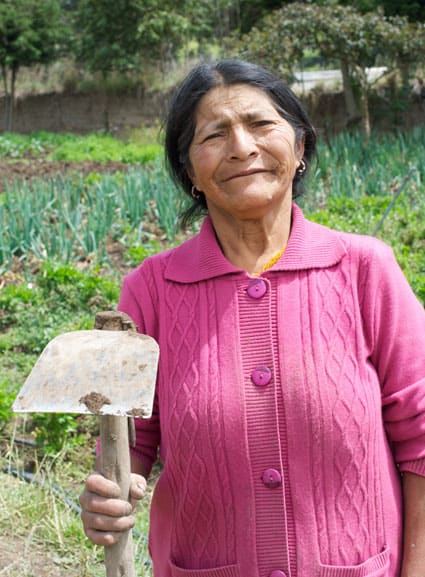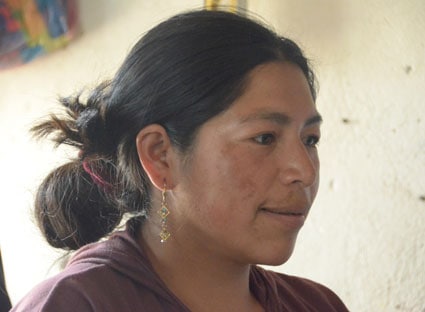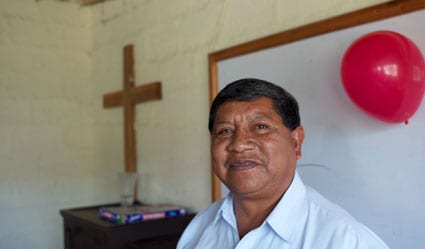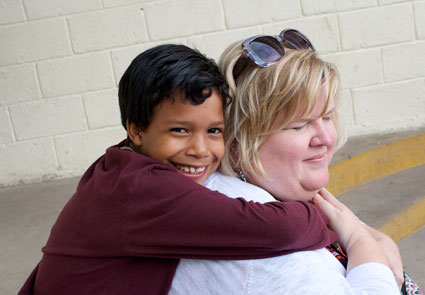![]() What does poverty mean? It all depends.
What does poverty mean? It all depends.
What does poverty mean to a child orphaned by cancer and abandoned by his father? It means he has to learn how to dream again.

What does poverty mean to the great aunt taking care of him, and his six year old sister? It means fear. Fear that someone may take the children away from her.

What does poverty mean to a mother who lost her two-year old child to pneumonia while waiting at the hospital for treatment? It means the Body of Christ is a refuge.

What does poverty mean to a man once persecuted because of his faith? It means he becomes a pastor and serves His Savior for 28 years and counting.

What does poverty mean to a boy who learns about Jesus Christ on a regular basis? It means self-respect, self-esteem and the ability to love.

What does poverty mean to you? I don’t know exactly.
But I do know it’s an opportunity to provide an opportunity. And it means possible discomfort and sacrifice.
It definitely means joy too.

It means hope for one who may have given up hope.

It means a future.

What does poverty mean to a child without a sponsor? It means a sponsor is needed.
To the masses of poor, poverty means dependence, marginalization, scarcity, incapacity and restrictions on rights and freedoms.
Poverty is defined by the World Bank as hunger, lack of shelter, being sick and not being able to see a doctor. It’s not having access to school and not knowing how to read. Poverty means not having a job, fear for the future and living one day at a time. Poverty is powerlessness.
But the most important question we need to ask ourselves and each other is,
What does poverty mean to God?
We originally published this post on Nov. 11, 2011. Photos by Keely Marie Scott and Patricia Jones from the Compassion Bloggers trip to Ecuador.







29 Comments |Add a comment
Real poverty is fundamentally a lack of options. Those in extreme poverty in developing nations lack education, because they lack access and/or financial means for tuition or uniforms or books and supplies; they lack jobs because they lack education and/or skills, or because economic opportunities where they live are very restricted; they lack food, because they lack money to buy it, because they don’t have jobs. They are unhealthy, because they lack good nutrition, because they lack money, because they lack jobs, etc. Real poverty is all-encompassing, and it includes spiritual deprivation, either because they have not heard the gospel of Jesus Christ, or they have not responded to it. And that is the deepest poverty of all: It means the abject lack of hope.
I have done, I know, an inadequate job of defining the holistic nature of poverty, but I tried to show how each area ties into the others. A lack of resources, yes; but also a lack of options and a lack of hope. I have seen such poverty, and the heaviness of it stayed with me for a week, after I returned home. And honestly? I’m not sure what I saw was really the worst that there is.
I think it is the state of being poor, but let us not run away from the fact that it also depends on how you view it, an identification of poverty is you relationship to the means of production.
I thought I grew up in poverty. I was poor relative to the culture around me. But it is nothing like the debilitating poverty experienced by so many. The biggest thing I think we can do to help people who are in “relative” poverty is to understand “it’s no shame to be poor.”
poverty is worst than disease. it is equal 2 violence….IF A FREE SOCIETY CANNOT HELP MANY PEOPLE WHO IS POOR, THEN….. IT CANNOT SAVE THE FEW WHO ARE RICH……… INDIA IS A RICH NATION WITH POOOOOOR PEOPLE……!!!!!!!!!! SEEEEEECCCC THIS IS THE CONDITION…….
Poverty is the worst thing for the people living in the world. It is worse than the disease . It can be cured by taking medicine, but the poverty could not cure like this. It has a wide context to be poor. God said that the thing you do for the poor is the same you do unto me. So, we have to do for the poor.
Poverty is as a result of lack of love for others. Those who have does not want to share with those who has not. Most government policies in some countries of the world are not for the interest of the poor.
poverty is worst than sickness, and the church is not rising up to her responsibility, God said His which for the church is that the church should prosper and live in good health. Men should try to practice real love then poverty can give wayyyyyyyyyyyyyyyyyyyyyyyyyyyy.
poverty is still around because some people don’t really care and others that do don’t want to start small and always wishing if they have so much, but still with the little u have u can help change someone’s level from being poor to being comfortable and u will be surprised at the end of the day how many lives u have touched.
Poverty is something with divergent definitions, because every individual,family,society,state will view it in different way. I think my definition of poverty is ”Deprivation of resources measured in terms of money income,consumption and thus those who are poor are vulnerable to abuse.”
i filll very sorry for the poor i always wish i was working so i can help
Poverty is not only having no money. For those in developing countries it also is not having the materials and resources to fulfill their basic needs. A person can be poor when they don’t have access to employment and basic healthcare, education and essentials like food, clothing and water.
It is true that God does not bless us all with wealth. He made us different with different future. He made us different as how he made our fingers unequal.
SOMEONE MAY BE RICH BUT DOES NOT KNOW WHAT IS LOVE.I THINK THAT BEING POOR IS NOT A SIN BUT A PART OF THIS CRUEL WOLD NO ONE WANT TO BE POOR BUT CAN TRIED TO ESCAPE FROM IT AND IT ITS NOT POSSIBLE THAT MEAN THAT HIS DESTINATION ON EARTH IS TO REMAIN POOR TILL THE END OF THEIR LIFE THAT THOSE PERSON WHO WILL GAIN THE PARADISE OF GOD.
Excellent ideas. Thanks a lot.
I use to think like most of us do ” if I only had so much money I could…” The last time I thought that right away my children that I sponsor came to mind. I though wow to them I am rich which really I am compared to them. It really help me put things in perspective and be thankful for what I have and the blessings that God has given me.
Excellent post. Thank you for sharing…..
I sit on the board of a human trafficking NGO and one of the things we talk about so often is how human trafficking is poverty issue and there is no way to root it out without addressing poverty. We sit in our comfortable homes in the US and forget about those around the world who have 95% less than we do — no matter how little we might have. As Rick Warren often reminds us, if we have and change in our pockets or laying around we are richer than 95% of the world. That is always so sobering to hear.
Yes, I agree. We need to love God, love people. But, we also need to remember to love those close to us.
I agree…however, in the US we don’t know starvation. We know poverty and hunger. But even this cannot be compared with starving underdeveloped nations because if someone here REALLY wants help it is near by. Not so in regions experiencing starvation.
On my first sponsor tour, as we walked dusty roads (which are mud flats, in rainy seasons), one woman with us told me, “I’ve see this same level of poverty in the defunct mining towns in Pennsylvania.” I tried to counter with the argument that we have resources, here, that aren’t available in developing nations. She was more knowledgeable than I about those defunct mining towns, as I’ve never visited one. She said the people still living there either don’t know about those resources, or they have no way to avail themselves of them, or they are too uneducated to be able to do so. And no one goes to those towns to enroll people in welfare services–medical care, food stamps, and so on.
That was almost 10 years ago. I doubt much has changed in those areas.
Oh–I was talking to a woman, a few years back, who co-pastored a church with her husband in our city, in one of the pockets of poverty. She told me about a 10-year-old boy who sang in the choir. She said that he often came to church unable to sing, because there was no food in the house and his stomach hurt, too much, from hunger.
That shouldn’t happen. Not in this society, not in this–or any other–city. I’m hoping it’s changed, as more churches have reached out, locally, to serve people; as more pastors have met together to pray for God to transform our city and to use our churches to do it. There’s still much that needs to change, but change is happening. Our public schools now call on churches to help them–to mentor children, to help with building maintenance and grounds, and to interact more with children, faculty and staff. More and more people are involved in ministry throughout the city.
I am sorry, I did not mean that we should forget about those who are in other countries. I was just saying that we should also not forget about those around us. We should love them too. If you have time watch this http://thechapel.com/onlineviewing/?p=1745 it may help you understand what I am saying. I am all for children in poverty and helping them, I wish I could do more. But, I do not want to ignore those just outside the door, so to speak.
Very true. It’s one thing to love the poor across the globe, that we will never meet, see or smell. It’s another to love the poor across the train tracks, in our own backyard, where we can see their dispair, smell their lack, and have to confront our own wealth at a whole new level.
I personally know the truth in this. This is an honest and shocking reality. Someone please take the time to check out my blog. Humble Thanks.
I love this post. Very powerful.
“What does poverty mean to God?” I think what it shows God is that there are people out there who are hoarding their money, their resources and their blessings and not giving to others as He has commanded. (i.e. People who are disobedient.) God has given the world, as a whole, enough for everyone to be fed, clothed, educated, loved, nurtured. The fact that there are people whose needs aren’t being met should be a call to action for people who have more than they need.
There are so many scriptures in the Bible that testify to this: Isaiah 58:7; 2 Corinthians 9:9-11; James 2:8; Luke 3:11; Matthew 25:25-35; Proverbs 28:27; James 1:27. Some of the most passionate writing in the Bible addresses the topic of how we treat one another and the idea that we should care for one another.
I agree, Lisa. My first thought on reading the question was, “It means His Church is not doing the job. It means not enough of His people are following His commands. It means we, as His Body on earth, have not fully grasped His heart and taken up His Cross.
You are a beautiful person…I am not christian myself but I do believe in the basic nature to help those who need help, and it is so hard to convince others that it is not always a evil or lazy nature that makes a person poor. To me you sound exactly like what I always thought a true christian should be and I thank you for your kind words and examples.
I highly agree to what my sister has said,and we should not forget that God did not make all of us rich equally according to how i believe and understand the bible. there are people whom God has made to be needy 1Samuel2v7-8..the bible reveals how God has made others to be rich and poor,how he has put others on higher positions and put disgrace on others,therefore, we musnt judge the poor and think that they are not word doers,or loving or giving as they should.Thats not always the case of their sufferings.
In our churches we fellowship with the so called ‘POOR’,=,but that does not mean that God is punishing them, i believe that he is preparing them for the greater treasure and he wants to make those peple his living testimony when he lifts them high on his appointed time
Perfect.